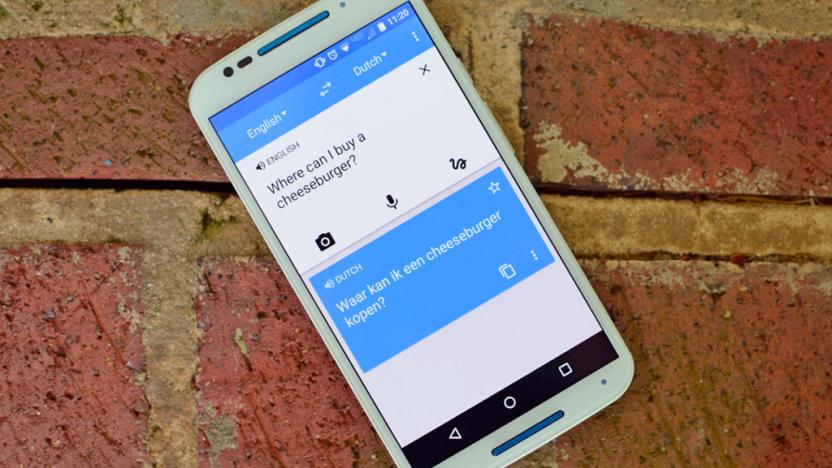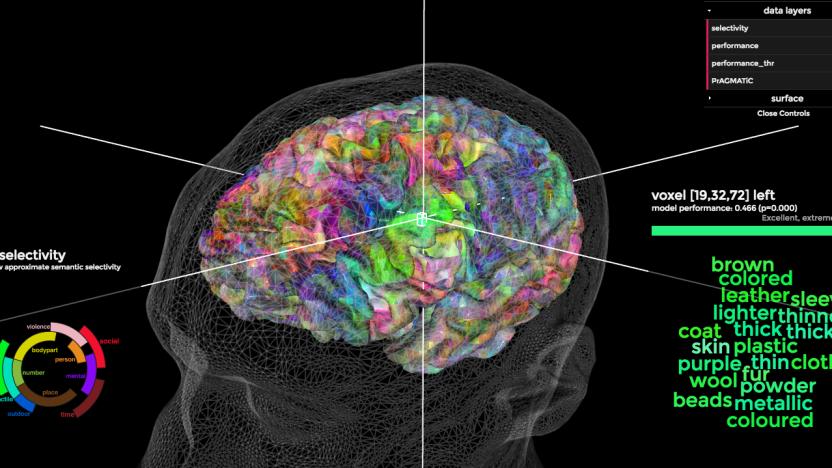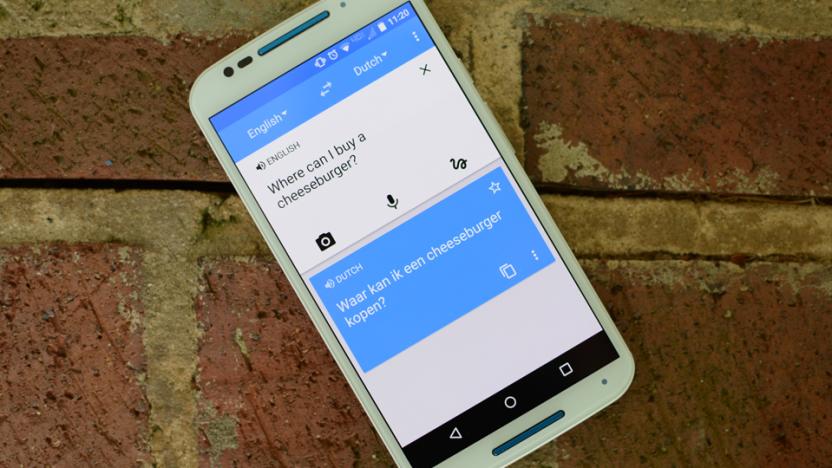language
Latest

Giphy made 2,000 GIFs to help you learn sign language
A GIF can be more than a well-timed punchline for a tweet or group chat. Now, the looping clips can be used to teach people new languages. As Mashable reports, GIF provider Giphy has launched a new "channel" containing more than 2,000 educational sign language clips. They're all dead simple: just the hand movements and a text caption explaining what they mean. These bite-sized flash cards have been pulled from Sign With Robert, an instructional series for American Sign Language (different versions are used throughout the world). The hope is that people will pick up a word or two by sharing them at convenient moments online.

Duolingo's clubs make language learning a competition
Duolingo debuted chat bots to help you learn a new language back in October, but now the company is looking to offer a bit more human interaction. Today, it introduced a new feature called Language Clubs so you can band together with friends and other users who are attempting to tackle another language. Think of it like how you compare accomplishments with your friends in fitness apps and you'll get the idea.

Omnity's search engine uses rare word matching to find unexpected results
When it comes to search, there's Google and there's everyone else -- the company is basically synonymous with searching the internet. But Omnity, a relatively new company from San Francisco, thinks its own search that's based on "semantic mapping" offers something that Google can't do. Omnity's trick is that it looks for the connections between documents on the internet based on rare words -- the theory that research that has several of the same rare words will likely be about related topics, even if that research doesn't directly link to or cite each other.

Recommended Reading: Fake news writer takes blame for Trump's win
Facebook Fake-news Writer: 'I Think Donald Trump Is in the White House Because of Me' Caitlin Dewey, The Washington Post Facebook's struggle with fake news has been widely reported and the issue is still a hot topic in the days following the US presidential election. The Washington Post caught up with Paul Horner, a man who has made a living off of news hoaxes over the last few years, some of which got picked up by the media and the Trump campaign as legit stories. "His followers don't fact-check anything -- they'll post everything, believe anything," Horner said. "His campaign manager posted my story about a protester getting paid $3,500 as fact. Like, I made that up. I posted a fake ad on Craigslist."

Google expands mission to make automated translations suck less
What started with Mandarin Chinese is expanding to English; French; German; Japanese; Korean; Portuguese and Turkish, as Google has increased the languages its Neural Machine Translation (NMT) handle. "These represent the native languages of around one-third of the world's population, covering more than 35 percent of all Google Translate queries," according to The Keyword blog. The promise here is that because NMT uses the context of the entire sentence, rather than translating individual words on their own, the results will be more accurate, especially as time goes on, thanks to machine learning. For a comparison of the two methods, check out the GIF embedded below.

Learn a new language with Duolingo's chatbots
Duolingo has been offering language learning tools for a while now, but today the company debuted a new tool inside its iPhone app that could make the task a bit easier. Thanks to AI-powered chatbots, the language-learning app offers a way to have conversations while you're trying to learn French, German and Spanish. That's a short list of languages for now, but Duolingo says more options are on the way.

Researchers say dolphins speak to each other in full sentences
It's not just the family dog that can understand complex language. Researchers at Karadag Nature Reserve in Feodosia, Ukraine have made an incredible discovery: dolphins are able to speak to one another in complete sentences containing up to five words apiece.

Dogs understand what you're saying, not just the sound of your voice
One pinnacle of human development has been the ability to comprehend language, thought to be a major achievement separating us from the animals. So it was assumed with dogs, but new research reveals that canines understand more subtleties in speech than we thought thanks to similarities in brain regions to those of humans.

Facebook is making it easier to post in multiple languages
Facebook has over 1 billion users around the world but, as you might expect, not all of them speak the same language. This can be an issue if you have friends and family who speak in different lingo. The company has supported multiple languages for several years now, of course, but what if you wanted to write a post that was readable by not only your English-speaking friends, but those who know Spanish and French too? Well, you could soon do that, thanks to a new multilingual composer that Facebook is testing out. With this feature, you can write a single post in multiple languages, while those who read the post will see it in just their preferred language. The feature actually rolled out earlier this year to Page authors, but is now being tested widely across all users.

Instagram adds a translation feature for text inside the app
On the heels of announcing it amassed 500 million users, Instagram is adding a new feature to help its global audience better understand each other. The filter-driven photo and video app will get a translation tool "in the coming month." When it arrives, you'll be able to tap a "See Translation" link to make sure you know exactly what a bio, caption or comment says. Instagram currently supports 24 languages, but it did explain that older comments and captions may not be privy to the update.

Google makes its most powerful language parser open source
The days of us communicating with our computers by using our fingers are nearing an end. Google announced on Thursday that it is releasing its language parsing neural network framework, SyntaxNet, as an open source system. The released code includes everything you need to train it using your own data set, though Google is also releasing a version already fluent in English: Parsey McParseface.

Long Reddit threads will eventually mention Nazis or Hitler
It's logical that as any public discussion expands, either through the number of participants or contributions, there's a greater chance it will touch upon new, divergent topics. This idea is neatly wrapped up in Godwin's law, a concept created by Mike Godwin, which states that as any online debate grows longer, "the probability of a comparison involving Nazis or Hitler approaches one." On Reddit, that's especially true -- in threads with more than 1,000 comments, the likelihood that "Nazis" or "Hitler" will be referenced at least once is more than 70 percent.

Scientists use 'Moth Radio Hour' to map meaning across the brain
Researchers at the University of California, Berkeley took on the complex task of mapping meaning along the cerebral cortex, the thin membrane that stretches across the entire brain, and their results suggest language is much more complex than previously thought. Seven volunteers listened to The Moth Radio Hour, a program where people share emotional personal tales, while lying in a functional MRI machine that tracked how their brains responded to 985 specific concepts, Science News says. Researchers mapped the blood flow to 60,000 to 80,000 pea-sized regions across the cerebral cortex, resulting in a dense word map covering the entire brain. Turns out, some concepts showed up in several areas across the brain: "Top," for example, appeared in a section that handles clothing and one that deals with numbers.

Google is using neural networks to improve Translate
Google has got a pretty good handle on AI, judging by its shocking back-to-back wins against a 9-dan champ Lee Sedol in the intricate strategy game Go. Though the company is using it in Google Photos, Gmail and other apps, it may soon bring deep learning to one that really needs it: Google Translate. Anybody who uses that app regularly knows that its translations are flaky, at best, especially for languages that are vastly different from English, like Sedol's native Korean.

Facebook wants to detect slang before it's popular
It's tricky to catch slang while it's still cutting edge. Unless you're in the right social circles, you'll probably hear that lingo when it hits the mainstream... in other words, when it's already passé. Facebook might have a way to catch those words while they're still hip, though. It received a patent for social glossary technology that would detect slang, acronyms and other neologisms. The conceptual software would look for terms that don't have a known meaning (including familiar words out of context) and add them to the glossary if appropriate. It'd even pull terms out of the glossary if they fall out of favor -- say, describing something as "totally tubular" when you're not an '80s-era surfer.

Oxford Dictionaries' Word of the Year is... an emoji
Oxford Dictionaries' Word of the Year is as much about capturing the cultural zeitgeist as it is reflecting the evolution of the English language, and that's truer than ever in 2015. For the first time ever, the institution chose emoji (the "tears of joy" icon you see above) to win the honor -- yes, actual words lost out. It's an odd decision, to put it mildly, but Oxford notes that the use of the word "emoji" more than tripled in the space of the past year, and the tears image was the most popular emoji worldwide.

Google Translate can help you with text in 20 new languages
Let's face it: Google Translate is a handy tool when traveling abroad or reading text on the web that's written in a different language. The software already offered help with seven languages, and today Mountain View added 20 more. This means that you'll be able to translate to and from English to Bulgarian, Czech, Dutch, Indonesian, Polish, Turkish and several others. You'll also be able to leverage one-way translation from English to Hindi or Thai. And all of those are just for printed text.

New Twitch rules let users restrict chat languages
It might be easy to broadcast your gameplay on Twitch, but engaging with the audience, attempting to be entertaining, playing whatever game you're streaming proficiently and keeping an eye on chat for trolls simultaneously is the exact opposite. A new feature from the Amazon-owned company should make at least the latter part a bit simpler, though. When you set your native tongue in "Broadcaster Language Mode," only folks who choose your selected language can chat. Basically, it's a way to help prevent people from using a different language to say stuff that'd otherwise get them banned.

WTF, 'Clickbait' and 'Emoji' are now officially words?
As the English language continues to evolve in response the internet's cultural onslaught, Merriam-Webster has announced that it's adding a host of new net-centric terms to its pages. In fact, the dictionary company has recently added a total of 1,700 terms to its word repository. Among them: net neutrality, click fraud, meme, photobomb, NSFW and a host of other words your kids have already been using for years. Numerous other, non-technical words made their way into Merriam-Webster Unabridged as well including jegging, crema, and colossal squid.

Learn Klingon from the comfort of your own planet
Can't figure out how to pronounce Qapla' or properly conjugate majQa'? Not sure what those words even mean? Well buy' ngop because Duolingo is gearing up to teach you. The language learning app has announced that it is working on a new course for a very alien tongue: Klingon. The company just needs to find somebody that actually speaks it first. The Federation-to-Klingon lessons aren't technically part of the core Duolingo framework as, say English-Italian is. Rather, it's being coordinated as part of the crowdsourced Language Incubator program. If you think you've got the linguistic chops to help develop this course (or just want to be notified when it's ready) head over to Duolingo and volunteer.









